Camping is a fantastic way to connect with nature, learn about conservation, and adapt to new environments. This guide aims to equip you with the necessary camping skills to safely and effectively enjoy your camping adventures. Whether starting in your backyard or venturing to a state park, this guide will help you prepare for a successful outdoor experience.
Outdoor adventures encourage campers to be comfortable in new environments, connect with nature, and learn the importance of conservation and the Leave No Trace principles. The outdoors present new challenges and experiences that can’t be taught in a classroom, making it essential to be well-prepared and knowledgeable about camping skills.
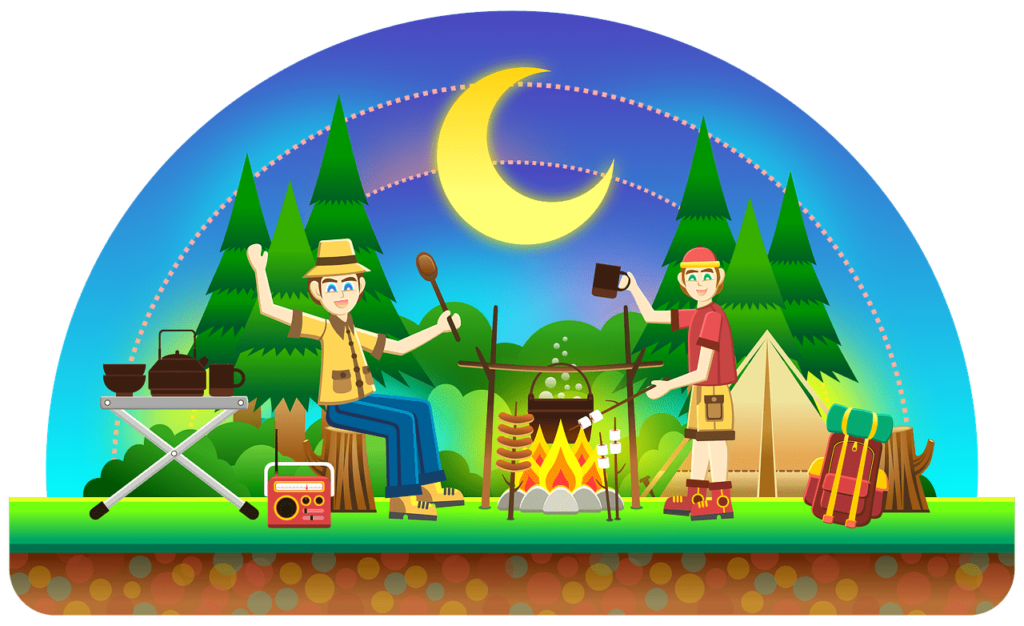
Preparing for Outdoor Adventures with Basic Camping Skills
How to Prepare for Outdoor Adventures
Planning an outdoor adventure might seem daunting, but with the right preparation, it can be a rewarding experience. Start by familiarizing yourself with the 8 Basic Camping Skills and ensure you complete any necessary training. Modern camping, which includes amenities like indoor bathrooms and kitchens, is a great starting point. Safety is paramount, so adhere to recommended safety guidelines and ensure all participants are aware of the rules.
Importance of Outdoor Progression
Progression allows you to gradually build your camping skills, starting with simple activities and advancing to more complex ones. This approach helps you gain confidence and competence in the outdoors. Begin with small steps like planning a short walk or an indoor sleepover, and gradually move to more challenging activities like overnight camping trips and multi-day outdoor adventures.
The 8 Basic Camping Skills
1. Using Good Outdoor Manners for Safe Camping
Good outdoor manners are crucial for ensuring safety and respect for the environment and others. Key rules include always having a buddy, asking permission before doing something, following instructions, disposing of litter properly, respecting plants and wildlife, and using appropriate voice levels.
2. Dressing for the Weather: Essential Camping Skills
Dressing appropriately for the weather is essential for comfort and safety. Here are some tips:
- Long Pants and Sleeves: Protect against scratches, insect bites, and sunburn.
- Material Choice: Cotton and wool are better than synthetic materials, which can cause burns near fire.
- Loose-Fitting Clothing: More comfortable and warmer in cool weather.
- Footwear: Sturdy, comfortable shoes with no open heels or toes. Avoid sandals in the woods.
- Rain Gear: Always carry a poncho or raincoat.
- Wind-Chill Factor: Be aware that wind lowers the effective temperature.
- Extra Layers: Pack extra sweaters or jackets, as it is usually colder in the woods.
- Kidney Area Warmth: Keeping this area warm helps overall comfort.
3. Tying Knots: A Fundamental Camping Skill
Knots are essential for various outdoor activities. Here are some basic knots and their uses:
- Overhand Knot: Used as a simple stopper knot.
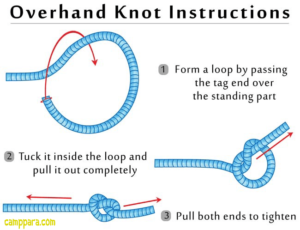
- Clove Hitch: Fastens a rope to a tree or post.
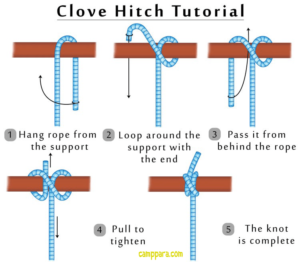
- Bowline Knot: Creates a loop that won’t slip.
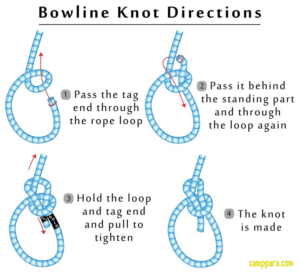
- Square Knot: Joins two ropes of the same thickness.
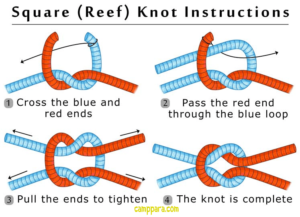
- Half Hitch: Fastens rope around a ring.
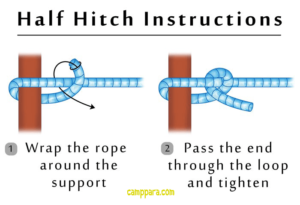
- Taut Line Hitch: Creates an adjustable loop.
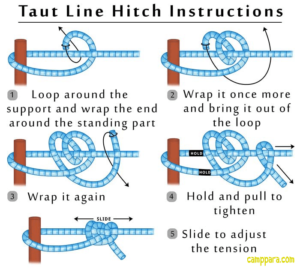
4. Handling and Caring for Knives: Essential Camping Skills
Knife safety is paramount. Always ensure you have enough space to use your knife safely. Open and close the knife with both hands, cut away from your body, and use the knife only for its intended purposes. Keep the knife clean and dry, and oil the joints to prevent stiffness. When passing a knife, hold the blade and offer the handle to the recipient, ensuring the cutting edge is facing down.
5. Making, Using, and Putting Out a Fire: Critical Camping Skills
Fire safety is critical. Always use a designated fire ring and never leave a fire unattended. Start fires with twisted paper, tinder, or fire starters, and avoid using liquid accelerants. Ensure you have materials nearby to extinguish the fire, such as water or sand. After the fire, remove ashes responsibly and replace any used wood.
Preparing the Fire Ring:
- Clear a fire ring down to bare ground with no roots underneath.
- Clear away all flammable material from inside and outside the fire ring for at least 10 feet.
- Have a rake or shovel and a bucket of sand or water nearby for fire control.
Building a Charcoal Fire:
- Use a charcoal chimney to start the fire.
- Wait until the top layer of charcoal has turned gray before spreading out to cook.
Building a Wood Fire:
- Collect three types of wood: tinder, kindling, and fuel.
- Structure the fire using methods like the A-frame or tipi foundation.
Extinguishing a Fire:
- Allow the fire to burn down to ash.
- Stir the ashes and sprinkle with water until there are no hot spots left.
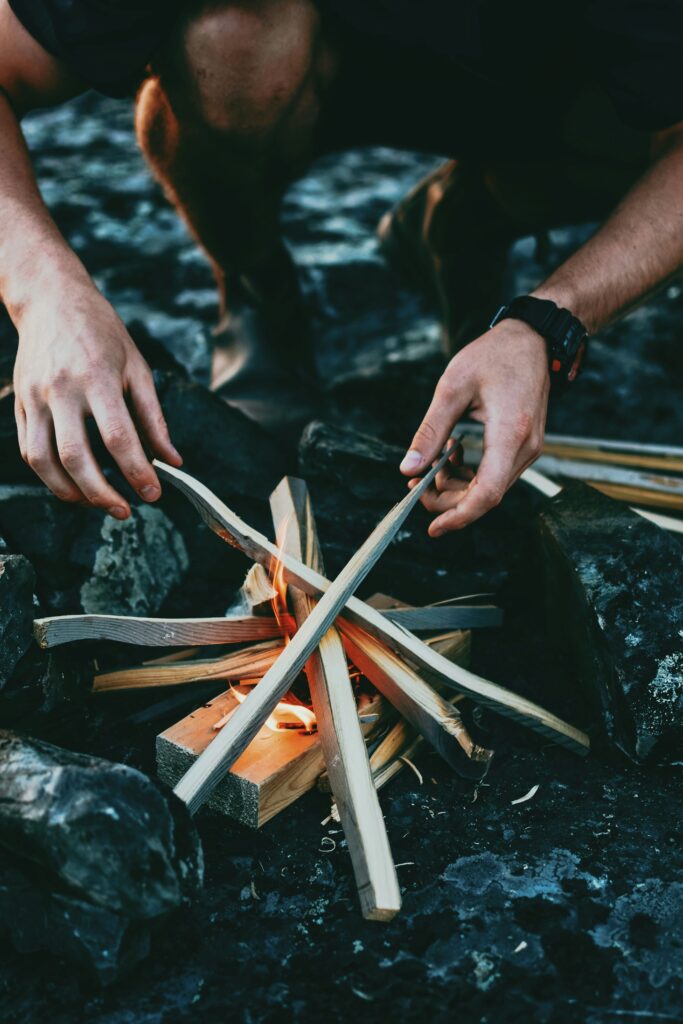
6. Cooking for Yourself or Your Group: Essential Camping Skills
Outdoor cooking can be a fun and rewarding experience. Start with simple methods like ready-to-eat meals and progress to more complex techniques like baking in a box oven. Always be prepared for dishwashing with three basins. Here are some tips for different cooking methods:
Foil Packets:
- Seal food in heavy-duty aluminum foil and cook on hot coals.
Wood Fire:
- Keep fires small and add wood as needed. Use soap or shaving cream on pots to prevent soot damage.
Box Oven:
- Build a box oven using a sturdy cardboard box lined with aluminum foil and a wire rack. Use hot coals to bake food.
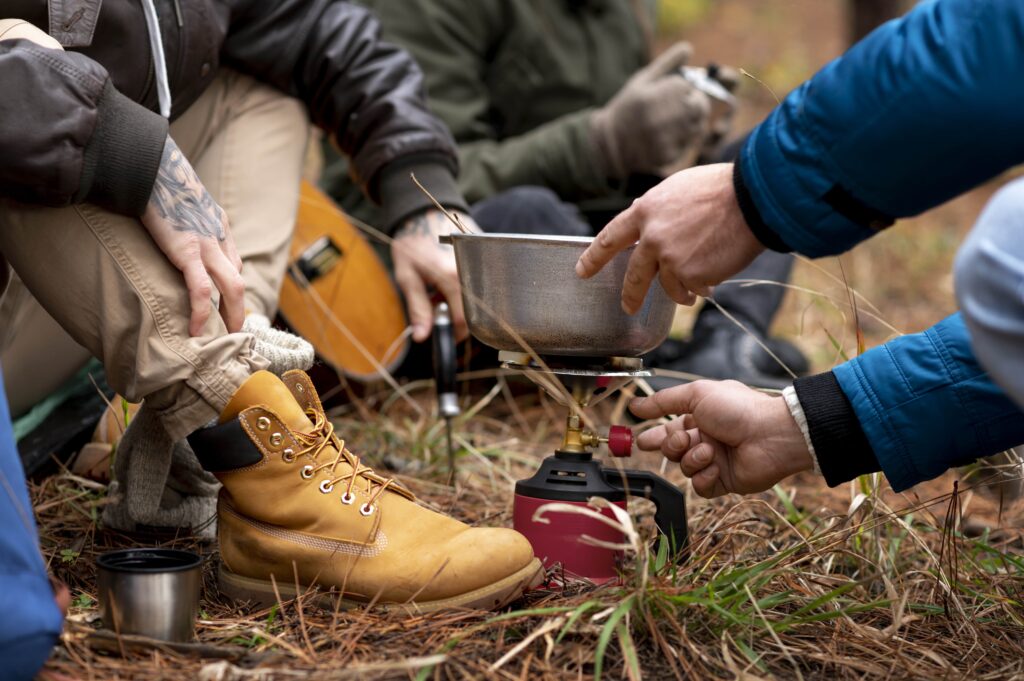
7. Simple First Aid: A Crucial Camping Skill
First aid is essential for outdoor adventures. Learn the importance of reporting accidents and unusual behavior. Always have a first aid kit and know where the nearest AED is located. Involve your group in making the first aid kit and familiarize them with emergency action plans.
Tips for Staying Organized in a Medical or First Aid Situation:
- Retain medical forms for all participants.
- Ensure medications are surrendered in original containers with clear usage information.
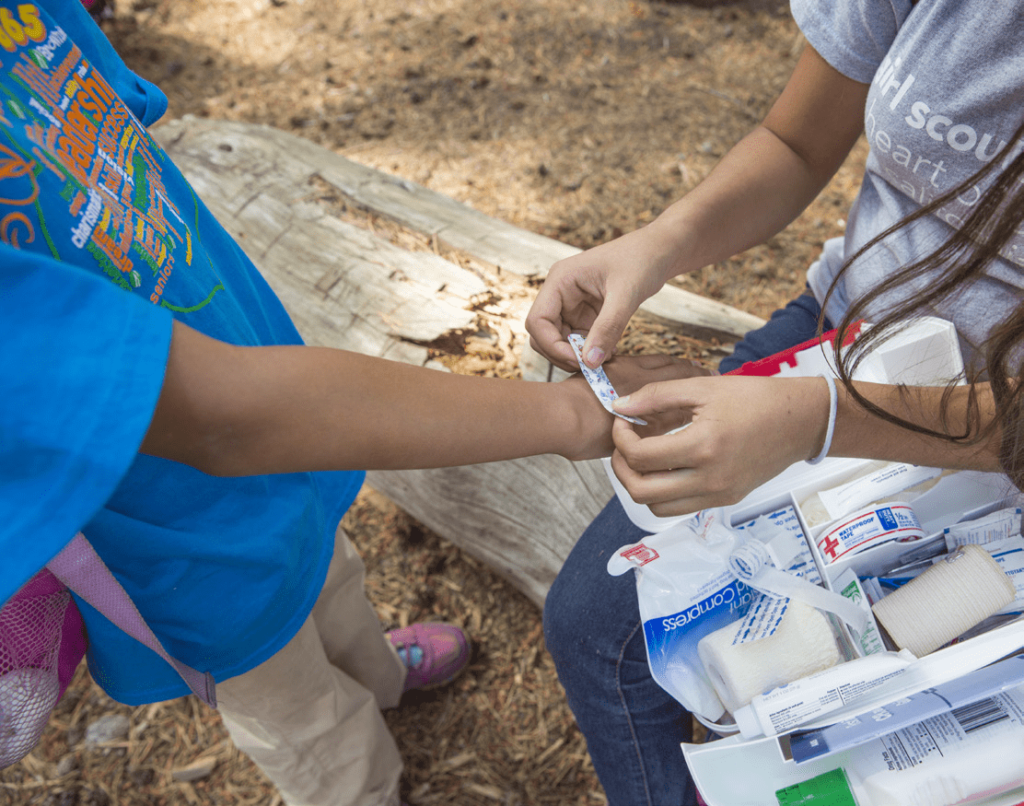
8. Protecting Nature with Leave No Trace Principles: Essential Camping Skills
Leave No Trace principles are crucial for minimizing the impact on the environment. These principles include planning ahead, traveling and camping on durable surfaces, disposing of waste properly, leaving what you find, respecting wildlife, minimizing campfire impacts, and being considerate of other visitors. Practice these principles with your group through fun activities.
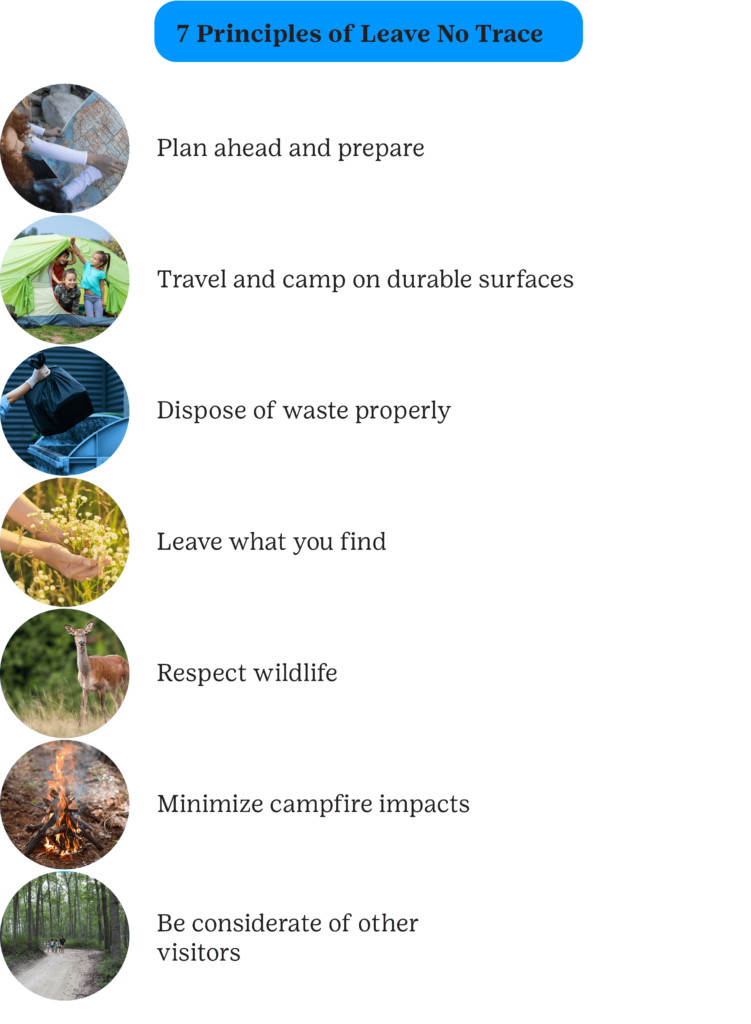
Practical Camping Tips
Choosing and Setting Up a Tent: Basic Camping Skills
Selecting a campsite is an important step in camping. Choose a site that is at least 10-15 feet from any fire area and 200 feet from creek or riverbanks. Look for level ground, protection from the wind, and avoid areas with dead trees or ant hills. When setting up a tent, clear the ground of sharp objects, lay a ground cloth, and follow the tent’s instructions. Ensure the tent is securely staked and add a rain fly if needed.
Setting Up Your Tent:
- Clear the ground of sharp objects like pinecones and rocks.
- Lay a ground cloth or tarp.
- Place the tent on the ground covering with the door facing away from strong wind.
- Fold edges of the ground cloth under itself so no ground cloth extends beyond the tent floor space.
- Erect the tent following instructions for that tent.
- Count your stakes and drive them one at a time, from opposite corners into the ground at right angles to the guy lines.
- Add the rain fly, if needed.
- Put markers or buffers like buckets or cans over the stake to prevent tripping.
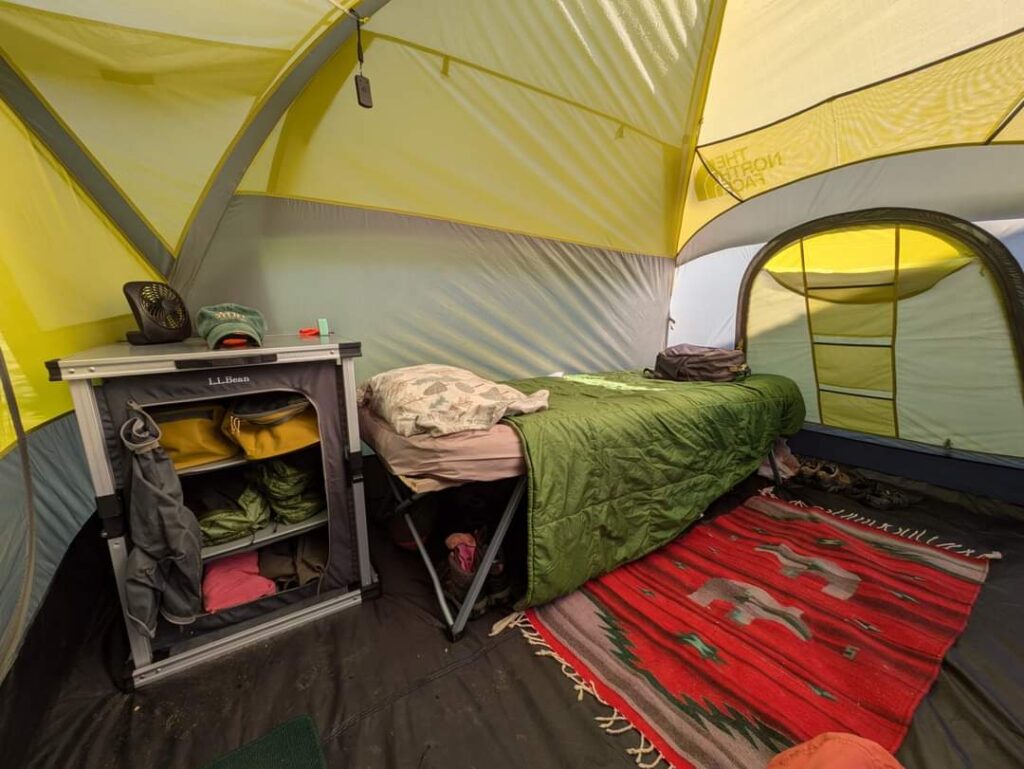
Winter Camping Tips: Essential Camping Skills
Staying warm and safe during winter camping requires proper preparation. Dress in layers and adjust clothing to the temperature. Wear a hat to prevent heat loss and insulate under your bedroll with materials like newspapers or foam pads. Plan to sleep warm by getting to bed before you become chilled and wearing clean, dry clothing.

Outdoor adventures offer unique challenges and experiences that can’t be taught in a classroom. By preparing and practicing the 8 Basic Camping Skills, you can ensure a safe and enjoyable experience. Encourage your group to explore and protect nature, and remember that outdoor fun is endless when you lead with confidence.
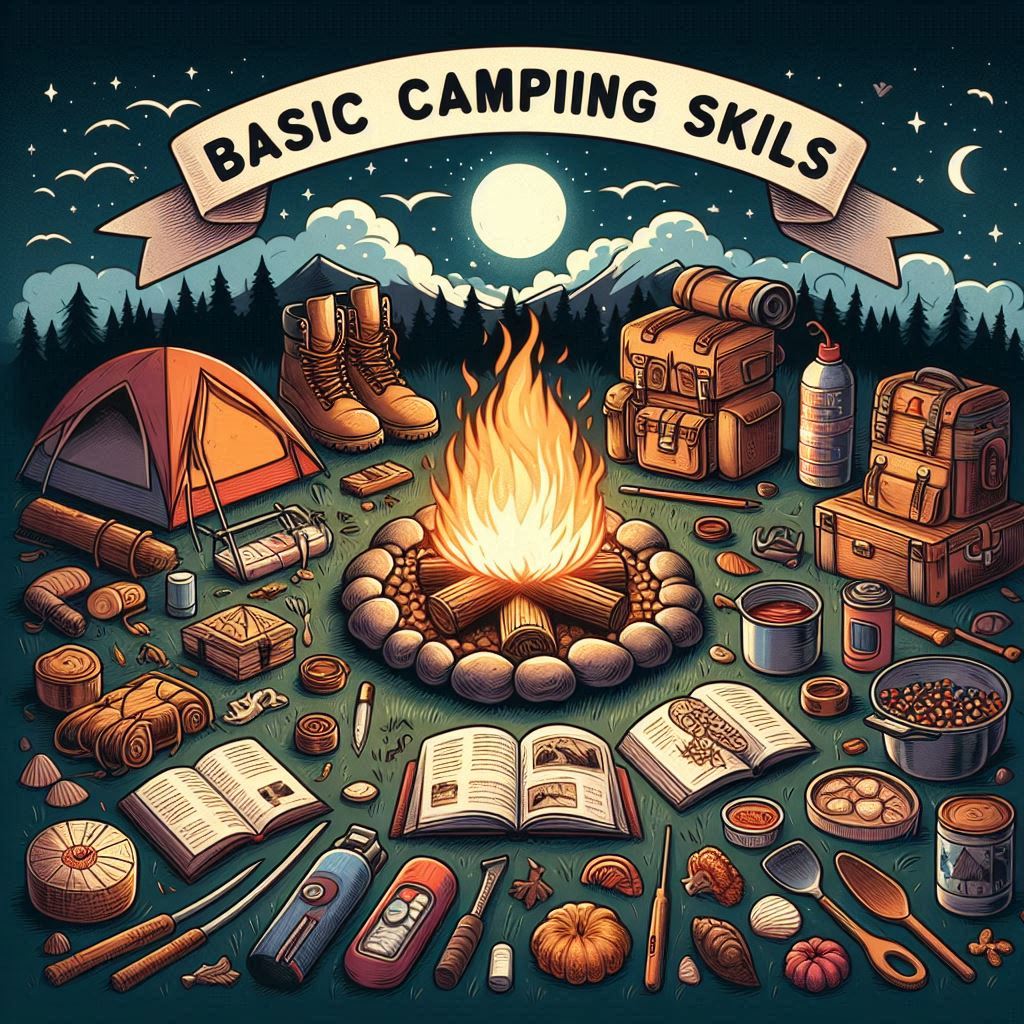
Hi, this is a comment.
To get started with moderating, editing, and deleting comments, please visit the Comments screen in the dashboard.